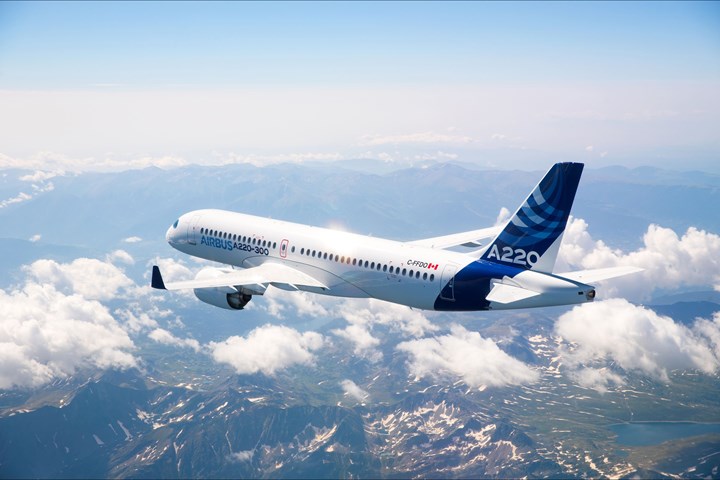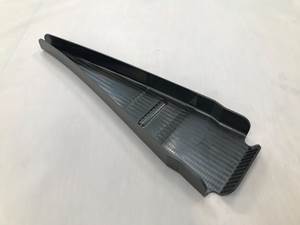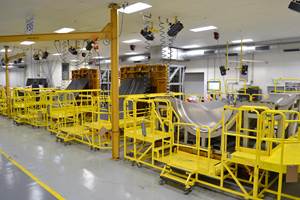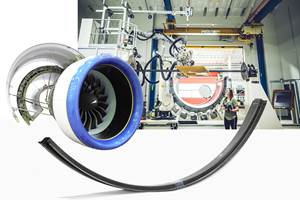FACC expands partnership with Airbus
Expanded empennage component production for A220 family positions FACC as an important long-term technology partner to Airbus, supports the company’s growth strategy for the future.
Share

A220-300 mid-flight. Photo Credit: Airbus
FACC AG (Ried im Innkreis, Austria) has been a trusted partner for Airbus (Toulouse, France) for many years. As of June 2021, FACC reported that this partnership is to be further expanded with the production of empennage components for the largely composite A220 aircraft, supporting the company’s growth strategy for the future.
“The first product that FACC, which at that time was still the development department of Fischer Ski, developed for Airbus back in 1981 was a supporting rod for the floor crossbeams of the Airbus A300,” says Robert Machtlinger, CEO of FACC AG, commenting on the long-standing partnership with Airbus. “Now, 40 years later, we are represented on all aircraft platforms — the A220, A320, A330, A340, A350 and A380 — with our innovative, lightweight components for the wings and engines, the empennage and the passenger cabin. The new order is not only a sign of our expertise and good cooperation, but also an important indicator for the years to come. Together, we will work on the development of new solutions that will shape the future while implementing our climate and sustainability goals step by step."
With the production of empennage components of the A220 aircraft, FACC says it is further expanding its know-how and safeguarding attractive jobs and its prominent role as a leading company in the region. “In order to establish ourselves as an innovative, stable and reliable partner to Airbus as well as to other major customers, FACC has invested more than €500 million in its plants and in highly automated facilities over the past 10 years. This is also a commitment to the location and to our crew,” emphasizes Machtlinger. “The state of Upper Austria has always been at our side as a close partner during these challenging times. With the new order from Airbus, we are pleased to be able to create new jobs and thus sustainably strengthen the region.”
Further, the new order is expanding FACC’s close cooperation with Airbus in the Aerostructures segment. FACC is the sole supplier for the A220 rudder and elevator. The first components will be delivered in early 2022. With its consistent growth strategy and clear commitment to top performance, the aerospace group is breaking new ground together with its partners, with the goal of making international airspace not only safer and more efficient, but also more environmentally friendly and sustainable.
The project itself comprises the manufacture and assembly of the rudders and elevators. “Technological leadership as well as the move towards more complex aircraft structures is a central topic in the aircraft industry, and we have been working on this intensively for years. FACC has achieved an internationally leading role as a result of vigorous research and development work,” says Machtlinger. “This is certainly one of the main reasons why Airbus now uses FACC’s know-how for the empennage components of the A220.”
The elevators and rudders serve to control and stabilize the aircraft in the air, and therefore play a central role in the flight operations of the Airbus A220. The technical requirements for the production of the primary structural elements are naturally demanding and complex, according to FACC: With a length of 6.4 meters and a width of 1.9 meters, the production of the rudder, for instance, not only requires the utmost precision, but also high-level logistical management. A sophisticated manufacturing concept and the in-house production of the metal components at FACC by means of a highly efficient automated five-axis CNC milling machine will ensure compliance with the high technical requirements.
Related Content
Welding is not bonding
Discussion of the issues in our understanding of thermoplastic composite welded structures and certification of the latest materials and welding technologies for future airframes.
Read MoreASCEND program update: Designing next-gen, high-rate auto and aerospace composites
GKN Aerospace, McLaren Automotive and U.K.-based partners share goals and progress aiming at high-rate, Industry 4.0-enabled, sustainable materials and processes.
Read MorePlant tour: Middle River Aerostructure Systems, Baltimore, Md., U.S.
The historic Martin Aircraft factory is advancing digitized automation for more sustainable production of composite aerostructures.
Read MoreThe potential for thermoplastic composite nacelles
Collins Aerospace draws on global team, decades of experience to demonstrate large, curved AFP and welded structures for the next generation of aircraft.
Read MoreRead Next
Developing bonded composite repair for ships, offshore units
Bureau Veritas and industry partners issue guidelines and pave the way for certification via StrengthBond Offshore project.
Read MoreAll-recycled, needle-punched nonwoven CFRP slashes carbon footprint of Formula 2 seat
Dallara and Tenowo collaborate to produce a race-ready Formula 2 seat using recycled carbon fiber, reducing CO2 emissions by 97.5% compared to virgin materials.
Read MorePlant tour: Daher Shap’in TechCenter and composites production plant, Saint-Aignan-de-Grandlieu, France
Co-located R&D and production advance OOA thermosets, thermoplastics, welding, recycling and digital technologies for faster processing and certification of lighter, more sustainable composites.
Read More


























